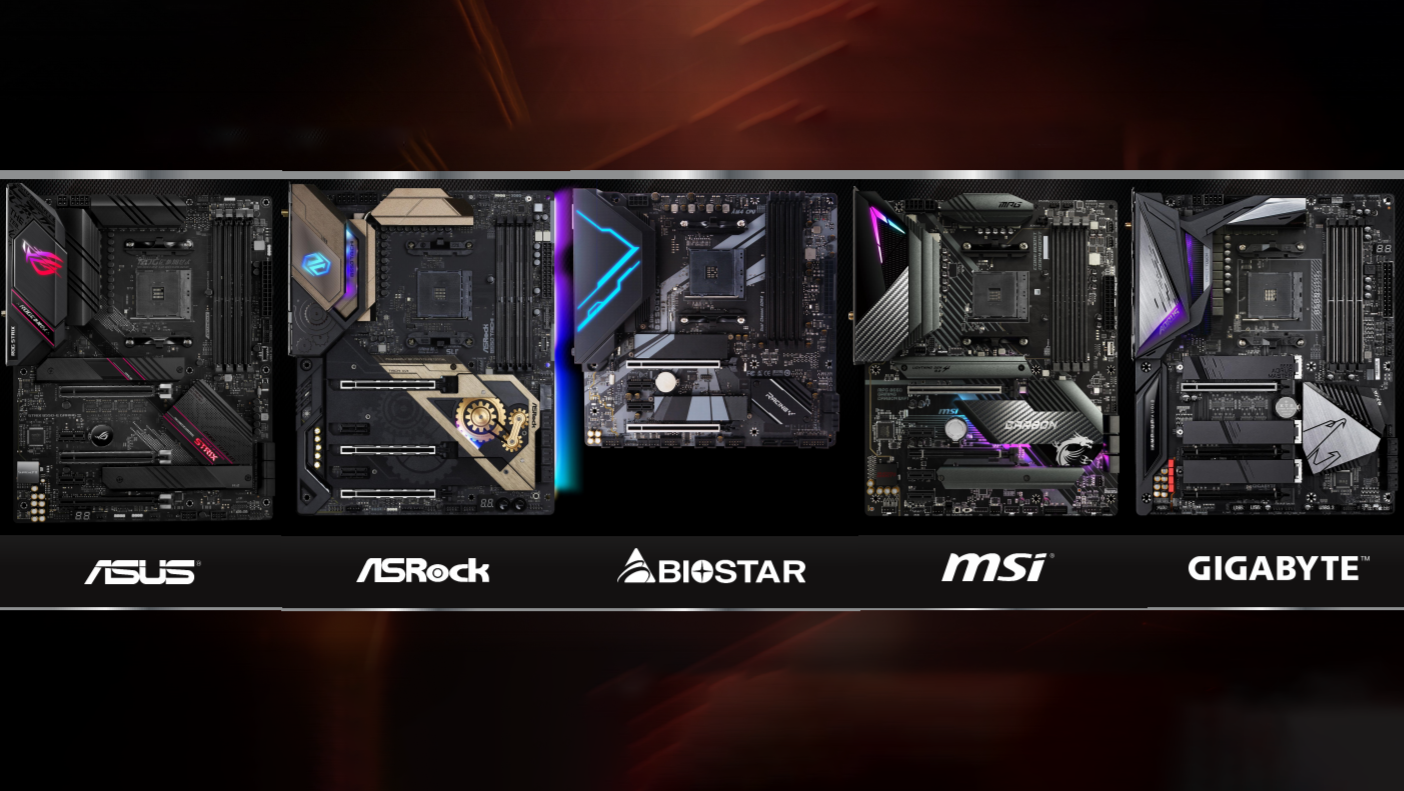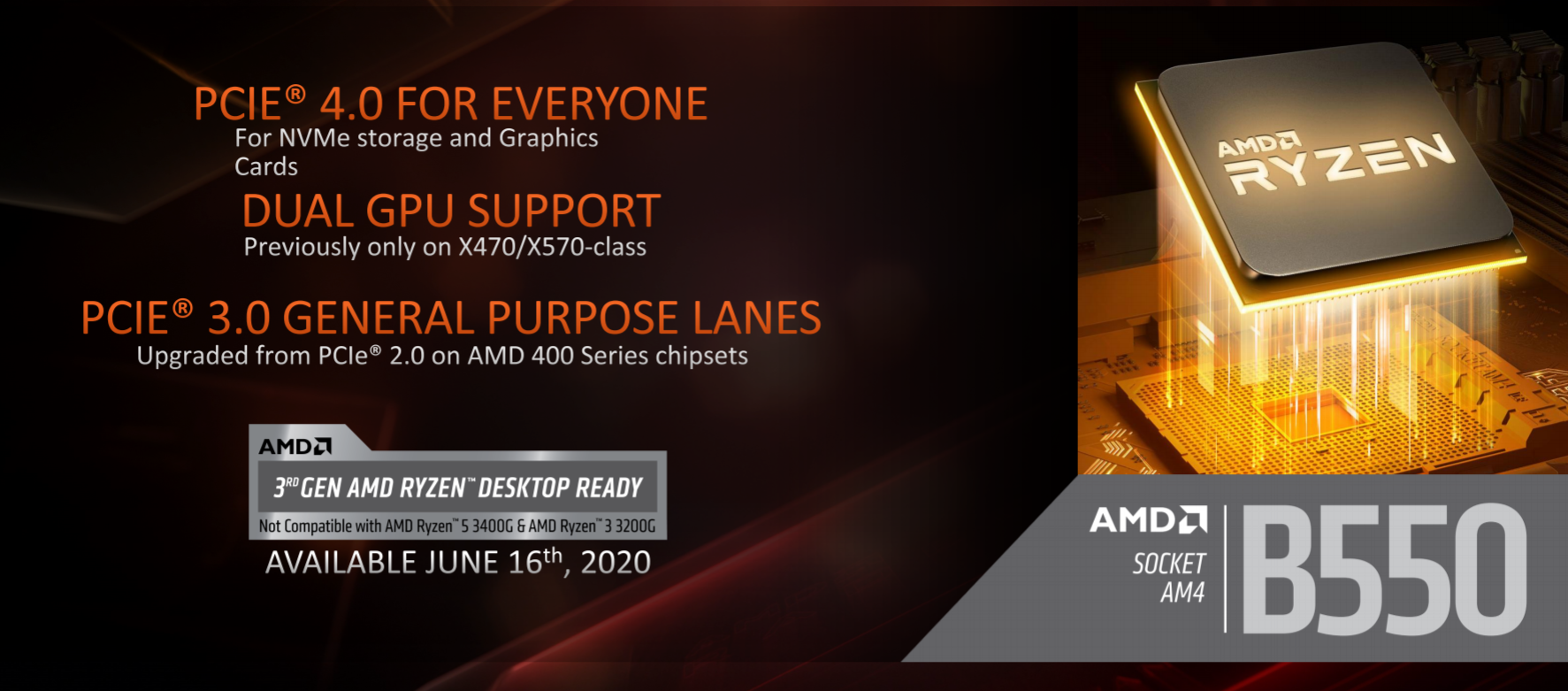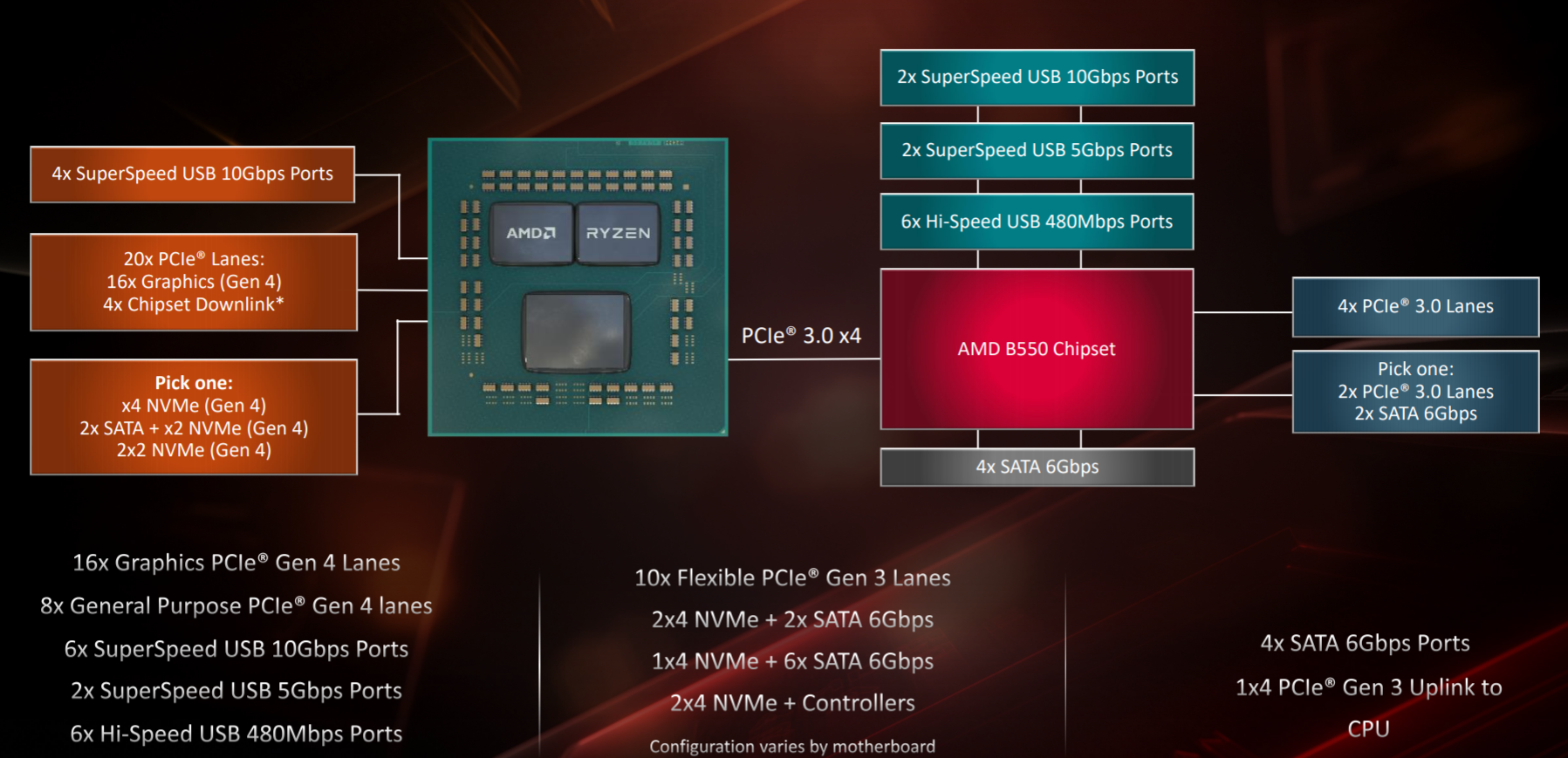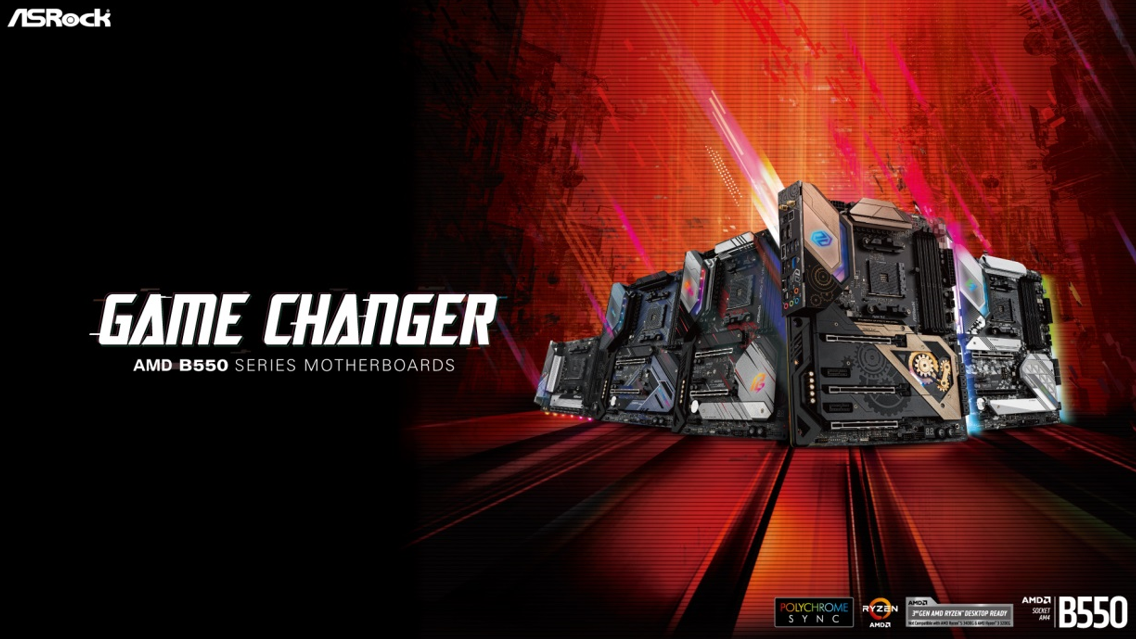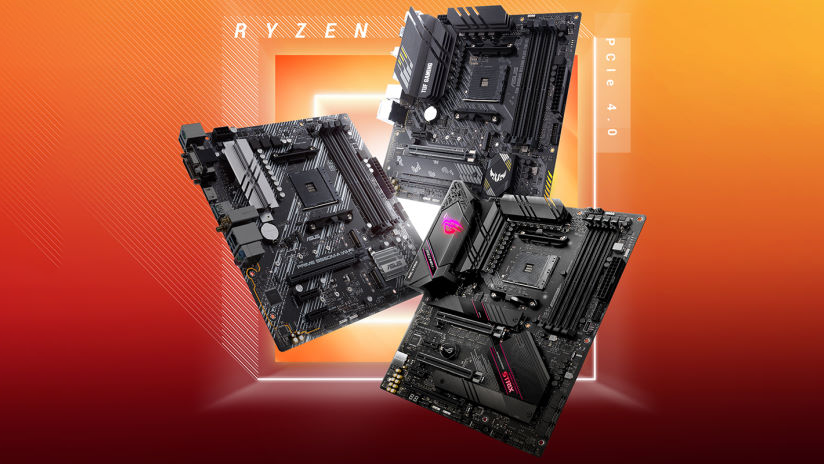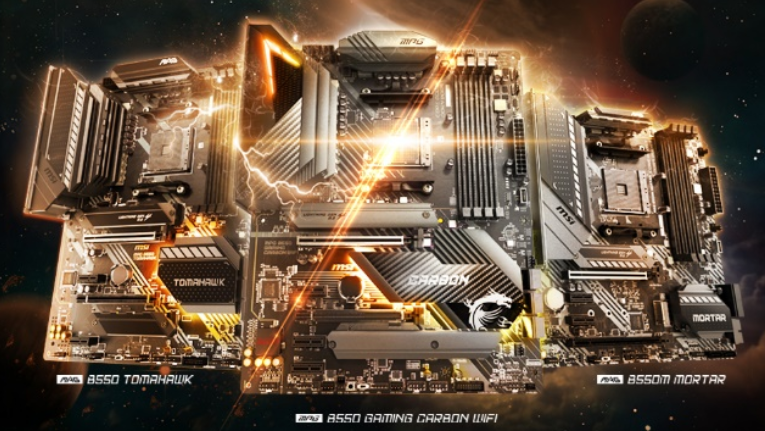AMD B550 Motherboards Announced: PCIe 4.0 Support for as Little as $100
5/23/2020 Update: We have removed pricing info from the Asus section below at the company's request, as it was apparently sent to us by mistake. You can still find the pricing information on various other sites, as well as some of it in the comment discussion below.
With AMD’s new mainstream Ryzen 3 3000 CPUs hitting our test bench a couple of weeks ago and Vega-packing Ryzen 4000 Renoir desktop chips seemingly waiting in the wings, now is as good a time as any for new affordable AMD motherboards. Board makers have recently been busy rolling out to Intel-based Z490 boards. But those same companies are also about to usher in a slew of B550 boards (announcing today and going on sale starting June 16) for recent AMD processors that bring most of the key features (like PCIe 4.0 support) of the higher-end X570 platform that launched last year at lower price points that start at $100.
Those who like their PCs to run silently will also appreciate that B550 chipset doesn’t require support for active cooling. The key consideration with B550 is that, while AMD has confirmed the chipset will support future Zen 3 processors, these boards won’t support Ryzen 2000 and earlier processors, or Ryzen 3000 APUs like the Ryzen 5 3400G--at least at launch. While the AM4 socket remains the same, ROM size limitations make it impossible for board makers to include support for all current, future, and past Ryzen processors with a single firmware package. Doubtlessly, there could be a way for code to be written and flashed to the chips to support various chip models. In fact, AMD announced the company was doing something similar to enable Zen 3 and Ryzen 4000 APU support for existing B450 and X470 motherboards. So companies could release future updates to flash these new boards to support older CPUs, but that’s not a feature you should count on. Of course, it’s in the best interest of the motherboard makers for you to just buy a new board. And neither the board companies nor AMD are likely excited to pay for the code to be written and deal with the doubtlessly large support hassle of an increased number of users flashing their BIOS to swap in code for older CPUs--and that’s assuming you have an existing supported CPU to use while flashing the code.
As such, if you have an older incompatible Ryzen processor (like the Ryzen 5 2600X in the system I’m writing this on), don’t expect to drop it into one of these B550 boards. Regardless, you won’t get PCIe 4.0 support unless you install a Zen 2-based Ryzen 3000 CPU in one of these boards, anyway.
AMD B550 Chipset: Affordable PCIe 4.0 for the Rest of Us
With all that out of the way, what exactly does B550 offer? Here’s how AMD sees it:
In short, you get PCIe 4.0 support through the CPU, delivering enough lanes for fast NVMe storage and the GPU. Also included is dual-GPU support (though that’s a feature with far less appeal in recent years), along with a doubling of the bandwidth of the motherboard’s general-purpose PCIe lanes from the chipset, from 2.0 to 3.0. That increased per-lane throughput allowed AMD to reduce the number of lanes between the chipset and CPU from six PCIe 2.0 lanes to four PCIe 3.0.
| B450 | B550 | X570 | |
|---|---|---|---|
| CPU Graphics Support | X16 PCIe Gen 3 | X16 PCIe Gen 4 | X16 PCIe Gen 4 |
| CPU Storage Support | PCIe Gen 3 | PCIe Gen 4 | PCIe Gen 4 |
| CPU USB Ports | USB 3.1 Gen 1 | USB 3.1 Gen 2 | USB 3.1 Gen 2 |
| Dual Graphics Support | No | Yes | Yes |
| General Purpose Lanes | PCIe Gen 2 | PCIe Gen 3 | PCIe Gen 4 |
| CPU Chipset Uplink | PCIe Gen 3 | PCIe Gen 3 | PCIe Gen 4 |
| Overclocking Support | Yes | Yes | Yes |
X570 still gives you much more bandwidth on the chipset level, as well as a faster uplink connection from the chipset to the CPU, stepping both up to PCIe 4.0. But for the vast majority of gamers and general-purpose users who will do little more than install a single GPU and one fast SSD, the bus bandwidth and other features provided by the B550 chipset should be more than enough.
Even support for fast USB 3.2 Gen2 USB carries over from the higher-end X570 side. Of course, as is always the case with mainstream motherboards, just because a feature is supported at the silicon level doesn’t mean it will show up as something you can plug into the final product. So be sure to check the feature list of any B550 motherboard before buying.
Get Tom's Hardware's best news and in-depth reviews, straight to your inbox.
B550 Motherboards: the Full List (So Far)
There will be lots of B550 motherboards to choose from when they officially go on sale on June 12--AMD says there are over 60 in development. But board makers (likely busy with the very recent launch of Z490 motherboards) seemed to still be sorting some of their B550 launch details as we wrote this. Pricing in particular was still largely undisclosed the day before this announcement, though AMD . We’ll add to this story when we hear of more models, but for now here are all the upcoming B550 motherboards we know about, from the usual suspects: ASRock, Asus, Biostar, Gigabyte, and MSI.
ASRock B550 Motherboards
| Board | Price | Form Factor | DRAM Slots/Capacity | NIC | Wi-Fi | Audio |
|---|---|---|---|---|---|---|
| B550 Taichi | TBD | ATX | 4/128GB | Intel I225V 2.5Gb | Intel 802.11ax | Realtek ALC1220 |
| B550 Extreme4 | TBD | ATX | 4/128GB | 2.5Gb | No | Realtek ALC1220 |
| B550 Steel Legend | TBD | ATX | 4/128GB | 2.5Gb | No | Realtek ALC1220 |
| B550 Pro4 | TBD | ATX | 4/128GB | Realtek RTL8111H 1Gb | No | Realtek ALC1220 |
| B550 PG Velocita | TBD | ATX | 4/128GB | Dragon RTL8125BG 2.5Gb | No | Realtek ALC1220 |
| B550 Phantom Gaming 4/ac | TBD | ATX | 4/128GB | Realtek RTL8111H 1Gb | Intel 802.11ac | Realtek ALC1220 |
| B550 Phantom Gaming 4 | TBD | ATX | 4/128GB | RTL8111H 1Gb | No | Realtek ALC1220 |
| B550 Phantom Gaming-ITX/ax | TBD | Mini-ITX | 2/64GB | Intel I225V 2.5Gb | Intel 802.11ax | Realtek ALC1220 |
| B550M Steel Legend | TBD | Micro ATX | 4/128GB | Dragon RTL8125BG 2.5Gb | No | Realtek ALC1220 |
| B550M Pro4 | TBD | Micro ATX | 4/128GB | Realtek RTL8111H 1Gb | No | Realtek ALC1220 |
| B550M-HDV | TBD | Mico ATX | 2/64GB | Realtek RTL8111H | No | Realtek ALC887 |
| B550M-ITX/ac | TBD | Min-ITX | 2/64GB | TBD | TBD | Realtek ALC887 |
Asus B550 Motherboards
| Board | Price | Form Factor | DRAM Slots/Capacity | NIC | Wi-Fi | Audio |
|---|---|---|---|---|---|---|
| ROG STRIX B550-E GAMING | TBD | ATX | 4/128GB | Intel I225-V 2.5Gb | Intel Wi-Fi 6 AX200 | SupremeFX S1220A |
| ROG STRIX B550-F GAMING | TBD | ATX | 4/128GB | Intel I225-V 2.5Gb | No | SupremeFX S1220A |
| ROG STRIX B550-F GAMING (WI-FI) | TBD | ATX | 4/128GB | Intel I225-V 2.5Gb | Intel Wi-Fi 6 AX200 | SupremeFX S1220A |
| ROG STRIX B550-I GAMING | TBD | Mini-ITX | 2/64GB | Intel I225-V 2.5Gb | Intel Wi-Fi 6 AX200 | SupremeFX S1220A |
| TUF GAMING B550-PLUS | TBD | ATX | 4/128GB | Realtek RTL8125B 2.5Gb | No | Realtek ALC S1200A |
| TUF GAMING B550M-PLUS (WI-FI) | TBD | Micro ATX | 4/128GB | Realtek RTL8125B 2.5Gb | Intel Wi-Fi 6 AX200 | Realtek ALC S1200A |
| TUF GAMING B550M-PLUS | TBD | Micro ATX | 4/128GB | Realtek RTL8125B 2.5Gb | No | Realtek ALC S1200A |
| PRIME B550-PLUS | TBD | ATX | 4/128GB | Realtek RTL8111H 1Gb | No | Realtek ALC 887 |
| PRIME B550M-A (WI-FI) | TBD | Micro ATX | 4/128GB | Realtek RTL8111H 1Gb | Intel Wi-Fi 6 AX200 | Realtek ALC 887 |
| PRIME B550M-A | TBD | Micro ATX | 4/128GB | Realtek RTL8111H 1Gb | No | Realtek ALC 887 |
| PRIME B550M-K | TBD | Micro ATX | 4/128GB | Realtek RTL8111H 1Gb | No | Realtek ALC 887 |
Biostar B550 Motherboards
| Board | Price | Form Factor | DRAM Slots/Capacity | NIC | Wi-Fi | Audio |
|---|---|---|---|---|---|---|
| Biostar Racing B550GTA | TBD | ATX | 4/128GB | RTL8125 | No | ALC1150 |
| Biostar Racing | TBD | Micro ATX | 4/128GB | Realtek RTL 8118AS | No | ALC1150 |
Gigabyte B550 Motherboards
| Board | Price | Form Factor | DRAM Slots/Capacity | NIC | Wi-Fi | Audio |
|---|---|---|---|---|---|---|
| B550 AORUS Master | TBD | ATX | 4/128GB | Realtek 8125BG (2.5GbE) | Intel Wireless- AX200 (WIFI 6, 2x2, | ALC1220-VB |
| B550 AORUS PRO AC | TBD | ATX | 4/128GB | Realtek 8125BG (2.5GbE) | Intel AC3168 (1x1 802.11ac) | ALC1220-VB |
| B550 AORUS PRO | TBD | ATX | 4/128GB | Realtek 8125BG (2.5GbE) | No | ALC1220-VB |
| B550 AORUS ELITE | TBD | ATX | 4/128GB | Realtek 8125BG (2.5GbE) | No | ALC1220 |
| B550 GAMING X | TBD | ATX | 4/128GB | Realtek 8118 (1GbE) | No | ALC 887 |
| B550I AORUS PRO AX | TBD | Mini-ITX | 2/64GB | Realtek 8125BG (2.5GbE) | Intel Wireless- AX200 (WIFI 6, 2x2, 802.11ax) | ALC1220-VB |
| B550 VISION D | TBD | ATX | 4/128GB | Two Intel i211AT | Intel Wireless- AX200 (WIFI 6, 2x2, 802.11ax) | ALC1220-VB |
MSI B550 Motherboards
| Board | Price | Form Factor | DRAM Slots/Capacity | NIC | Wi-Fi | Audio |
|---|---|---|---|---|---|---|
| MPG B550 Gaming Carbon WIFI | TBD | ATX | 4/128GB | Realtek RTL8125B 2.5Gb | Intel Wi-Fi 6 AX200 | Realtek ALC1200 |
| MPG B550 Gaming Edge WIFI | TBD | TBD | TBD | TBD | TBD | TBD |
| MPG B550I Gaming Edge WIFI | TBD | Mini-ITX | TBD | TBD | TBD | TBD |
| MPG B550 Gaming Plus | TBD | Mini-ITX | 2/64GB | TBD | TBD | TBD |
| MAG B550M Tomahawk | TBD | ATX | 4/128GB | Realtek RTL8125B 2.5Gb, Realtek RTL8111H 1Gb | No | Realtek ALC1200 |
| MAG B550M Mortar WIFI | TBD | Micro ATX | 4/128GB | Realtek RTL8125B 2.5Gb | TBD | Realtek ALC1200 |
| MAG B550M Mortar | TBD | Micro ATX | 4/128GB | Realtek RTL8125B 2.5Gb | No | Realtek ALC1200 |
| MAG B550 Bazooka | TBD | Micro ATX | 4/128GB | TBD | TBD | TBD |
| B550-A Pro | TBD | ATX | 4/128GB | Realtek 8111H 1Gb | No | Realtek ALC892 Codec |
| B550M Pro-VDH WIFI | TBD | Micro ATX | 4/128GB | TBD | TBD | TBD |
After a rough start with the Mattel Aquarius as a child, Matt built his first PC in the late 1990s and ventured into mild PC modding in the early 2000s. He’s spent the last 15 years covering emerging technology for Smithsonian, Popular Science, and Consumer Reports, while testing components and PCs for Computer Shopper, PCMag and Digital Trends.
-
NightHawkRMX This is $25 or more over a cheap B450. I think for systems with a CPU like a 3100 or 3300x, PCIe 4.0 is not needed and the buyers would prefer to have a cheaper motherboard. I think MSI -max motherboards (mostly the cheap ones) will still fit the bill for these systems.Reply
Also, the lack of support for 3000 series APUs on this is plain confusing, though I understand why the choice was made. If the box says "Ryzen 3000 Compatible" I could see how someone with a 3200g will be very unhappy when it doesn't work since the 3200g is a "Ryzen 3000" processor by name.
Honestly, AMD's motherboard situation is very confusing and will continue to get more and more confusing in many years on the used markets when you have no clue what generation bios is flashed onto a board. -
HideOut ReplyNightHawkRMX said:This is $25 or more over a cheap B450. I think for systems with a CPU like a 3100 or 3300x, PCIe 4.0 is not needed and the buyers would prefer to have a cheaper motherboard. I think MSI -max motherboards (mostly the cheap ones) will still fit the bill for these systems.
Also, the lack of support for 3000 series APUs on this is plain confusing, though I understand why the choice was made. If the box says "Ryzen 3000 Compatible" I could see how someone with a 3200g will be very unhappy when it doesn't work since the 3200g is a "Ryzen 3000" processor by name.
Honestly, AMD's motherboard situation is very confusing and will continue to get more and more confusing in many years on the used markets when you have no clue what generation bios is flashed onto a board.
well the 3000 APUs (and same for the laptop chips) is a joke. Their naming schemes are just schemes... -
InvalidError Reply
The lion's share of that extra $25 is most likely the chipset itself due to upgrading downstream lanes from PCIe 2.0 to 3.0 and probably beefed-up VRMs. Some of the added cost may also be inflation to offset losses from the last couple of months. You'd still be paying most of that $25 extra without PCIe4.NightHawkRMX said:This is $25 or more over a cheap B450. I think for systems with a CPU like a 3100 or 3300x, PCIe 4.0 is not needed and the buyers would prefer to have a cheaper motherboard. -
NightHawkRMX Reply
Exactly, however it leaves tons of confusion now, and it was confusing back in 2018 when the 2000 series APUs came out. Its a mess.HideOut said:well the 3000 APUs (and same for the laptop chips) is a joke. Their naming schemes are just schemes...
Intel is not immune to this:
Intel Core i7 10750h - 14nm, 6c/12t, Comet lake
Intel Core i7 1065g7 - 10nm, 4c/8t, Ice lake.
They both are 10th generation core i7 CPUs, but they are based on different architectures and even different nodes. Granted, you don't have any compatable mobo confusion since these are laptops. -
maikalwolf What the heck, Asus? Those prices are all over $100! You know you can find a X570 for under $150 on facebook!Reply -
logainofhades Asus is out of their mind. $279 for a B550 board? You can get a Gigabyte x570 Aorus Pro Wifi, for $269. They think just because they throw that strix label on it, it is worth way more, than it really is. My X570 Gigabyte ITX sells for less than what they want to charge for their B550 itx.Reply -
InvalidError Reply
Ice Lake and Comet Lake actually have two distinct numbering schemes: five digits model number + TDP class letter for Comet Lake vs four digits CPU model + 'g' + one number for the IGP class for Ice Lake. Fairly straightforward IMO.NightHawkRMX said:Intel is not immune to this:
Intel Core i7 10750h - 14nm, 6c/12t, Comet lake
Intel Core i7 1065g7 - 10nm, 4c/8t, Ice lake.
They both are 10th generation core i7 CPUs, but they are based on different architectures and even different nodes.
I wish AMD simply appended 'G' to model numbers to distinguish CPUs from APUs instead of doing its entirely messed up and unnecessary numbering of APUs 1000 model numbers above the CPU they are actually based on and appending the 'G' to that... but it cannot do that without causing even more confusion right now because previous-gen APUs already occupy that naming space, it'd need a secondary differentiator like Inte'ls gX postfix. -
agello24 At those prices in a world recession? no thanks. no way am i going to let any of those companies price gouge me. they can do better with the b550 pricing and drop the prices of the x470's. ill sit back and let the stupid ones buy them at those prices.Reply -
daworstplaya ReplyNightHawkRMX said:Also, the lack of support for 3000 series APUs on this is plain confusing, though I understand why the choice was made. If the box says "Ryzen 3000 Compatible" I could see how someone with a 3200g will be very unhappy when it doesn't work since the 3200g is a "Ryzen 3000" processor by name.
Honestly, AMD's motherboard situation is very confusing and will continue to get more and more confusing in many years on the used markets when you have no clue what generation bios is flashed onto a board.
HideOut said:well the 3000 APUs (and same for the laptop chips) is a joke. Their naming schemes are just schemes...
The problem is AMD used previous gen CPU designs in their APUs (Zen+ and Zen2) and named them 1 gen above to match their desktop CPUs (non APU). This wouldn't be problem if AMD just called their current 3000G APUs the 2000G series. And the 4000G series should be called 3000G series.
We all know their 4000 series APUs are actually 3000 series CPU + Vega GPU and probably share the same BIOS design. But AMD shot themselves in the foot.
I also wish AMD would call the Ryzen 7 3800x the Ryzen 7 3750x. Then they could've called the Ryzen 9 3900x the Ryzen 9 3800x and the Ryzen 9 3950x could be called the Ryzen 9 3900x. Then they would have 39xx numbers free for their Threadripper parts. But noooooooooo, that is too logical.
